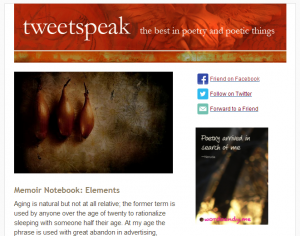I fell in love with words at an early age. I’ve always been a bookworm—as a child reading in the branches of trees, upside down on a couch, and, of course, in bed with a flashlight—and so a love of language and word play caught me young and never let go.
As early as grade school, I huddled over an aqua, faux-leather notebook scribbling words that were unafraid to journey far beyond our neighborhood. The journal, given to me by the artist aunt for whom I was named, traveled with me into high school. Even today—some forty years later—it leans against others on a bookshelf in my Pennsylvania home. Although I now compose almost exclusively on a laptop, every once in a while, I stumble on that tattered “collection” and remember…
Those first years its pages housed, among other literary ventures, poetic gifts. I was always giving poems away. I attached them to Christmas presents for family, tucked them inside birthday gifts to friends, and taped them to end-of-the-year thank you’s for teachers. Sincere but sappy, these poems were my calling card.
Yet without the support of family, such juvenile scribblings would have gone the way of lost luggage. In my house, writing was a valued skill, worthy of being nurtured. My mother, in particular, encouraged me, typing up my early attempts in “books.” My aunt took me with her on trips in her Volkswagon camper. She’d find a particularly captivating landscape and set up her easel. I’d take out my pencil and journal. Together, we’d create.
And so, when I was eight or nine, my family smiled when Campfire Girl Magazine accepted one of my poems for publication. They cheered when I later competed in high school writing competitions. And, although I had long before abandoned piano lessons, my parents still arranged creative writing tutorials with an Ohio State University graduate student. I was thrilled.
At Wheaton College, I was fortunate to study with excellent professors, including visiting authors Madeline L’Engle and Robert Siegel, who first inspired me to send work to literary journals. Later, I would learn to craft fiction and poetry with Sena Jeter Naslund at the University of Louisville—where I earned my MA with a creative thesis—and with A.R. Ammons, Robert Morgan, Ken McClane, and Phyllis Janowitz at Cornell—where I received the Sage Graduate Fellowship for my MFA in poetry.
But before all that, before those first scrawls, it was sound—music feathered with meaning and able to soar—that lured me in. As a child, I read and reread Ted Hughes’s animal poems; as a teenager, T.S. Eliot’s Four Quartets. Addictive cadences, lyrical images, bluesy repetitions—all these seduced my ear and tongue. I recited the lines again and again. I echoed the meters. I climbed onto the rhythms and started my ride.
And so it is now, in middle age, that I listen closely to poetry to hear the world. Its music has voiced the self in Perpendicular As I, sounded sorrow after my father’s heart transplant in Transplant, Transport, Transubstantiation, cheered baseball in Rules of the Game, and narrated my spiritual journey in Weeknights at the Cathedral. In the upcoming Local News from Someplace Else, it questions anew this cosmos we live in: a cacophony of school shootings and natural disasters, but also a symphonic universe of joy.
Most importantly, it has taken me on a sometimes trying, often exhilarating trek that began with my first journey of words. Although I no longer read in trees or hang upside down on a couch, I still use a flashlight to find my way. I call it poetry.
Photo by Uva Fragola, Creative Commons license via Flickr. Post by Marjorie Maddox Hafer, author of the upcoming poetry collection ‘Local News From Someplace Else.’
Browse more Journey into Poetry stories
______________________________
Subscribe to our free weekly newsletter.
We’ll make your Saturdays happy with a regular delivery of the best in poetry and poetic things.
Need a little convincing? Enjoy a free sample.
- The Secret of Literature: Everyday Epiphanies - July 29, 2016
- How to Write a Ballad - September 5, 2014
- Ode to the Ode - March 7, 2014

Megan Willome says
I like the idea of poetry as a flashlight. Just enough to see your way.
L. L. Barkat says
i liked that too, Megan 🙂
Marjorie Maddox says
Yes, not necessarily enough to see the final destination when you first start, but enough to get you there (wherever there ends up being) step by step by step.
Juliana Kapetanov says
I also like the metaphor of poetry as flashlight guiding us through challenging times. It seems to say that poetry can be used as a tool to make sense of the world in which we live. I often find myself writing poetry about personal experiences in an attempt to resolve some sort of conflict within myself. Writing poetry is like a type of healing in this way, even if, like Marjorie says, we can’t immediately see the final destination.
Marjorie Maddox says
Yes. And, in this instance of writing (even though it’s prose vs. poetry), I didn’t know that I was going to end with the flashlight image until I got there, which made me see the opening image in a whole new light (pun, of course, intended). 🙂
Any examples of similar experiences in writing? Of “discovering” your endings through the process of writing?
Juliana Kapetanov says
Actually, yes. I’ve had quite a few experiences like this. I write fiction and poetry, but I feel like this happens more with poetry. I usually just start writing, and where the poem goes is always a surprise. With fiction, I usually plan my ideas ahead of time.
Maureen Doallas says
Lovely reflection.